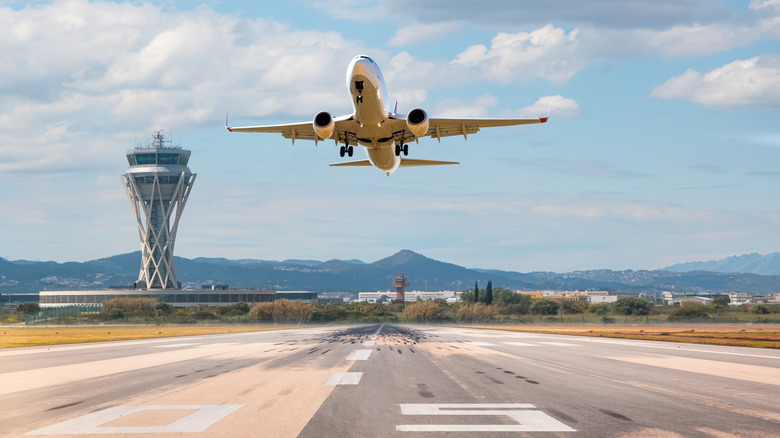What You Need To Know If Your Plane Is Diverted Mid-Flight
While diverted flights aren't very common, they do happen. Your plane's captain might interrupt your meal or movie mid-flight to tell you that you're unexpectedly landing in a completely different place for any number of reasons. Causes can range from something simple like bad weather to more extreme scenarios like bomb threats and an outbreak of war in your destination country. Thankfully, this only happened to 0.25% of passengers through all of 2024 in the United States. And while it's not too hard to imagine how shocking and upsetting this would be, lots of other diversion-related questions remain. For instance, where will the plane land? How do you get home? Is there any reimbursement from the airline? Who decides when flights get diverted, anyway?
Firstly, flights get diverted on a case-by-case basis. If the cause for a diversion affects only one plane, like when a passenger's laptop got stuck in the seat of a United Airlines flight in May 2024, then only that plane gets diverted. In that case, a plane en route from Switzerland to Chicago got diverted to Ireland over 850 miles away from its origin. If the cause for a diversion affects an entire region, then multiple flights might get diverted. Such is the case with Israel's June 13, 2025, bombing of military targets in Iran, which resulted in airspace over Israel, Iran, Iraq, and Jordan shutting down. Flights to Tel Aviv's Ben Gurion International Airport (TLV) were rerouted to Greece or Cyprus. But in all cases, a pilot generally collaborates with air traffic control to decide whether to reroute and to where the flight should go, taking remaining fuel, airspace, and airstrip availability into account.
The practical aftermath of a diverted flight
If your flight gets diverted, then there's nothing to do but tackle the practical concerns that follow, just like if your flight gets delayed. Those, however, boil down to the region under which your flight falls. For brevity's sake, we're going to cover two commonly traveled regions in this article: the United States and Europe.
In the United States, a diversion isn't considered a flight cancellation. This means that airlines are obligated to get you to your final destination no matter how far off-course you were diverted — provided your departure and arrival airports are on U.S. soil. Carriers will typically try to book people on the next available flight, although that might be difficult for larger flights. Most critically, airlines don't have to cover costs incurred in the interim. So if the next available flight is three days off and you've got to get a hotel in the meantime? That cost falls on you, but only if you accept the rebooking. Otherwise, the Department of Transportation's 2024-inaugurated Automatic Refund Rule ensures that you'll get a full refund if your flight is "significantly changed." This rule covers altered flight destinations and not when your flight is simply canceled due to inclement weather.
In the EU, a diverted flight is considered a canceled flight, even for flights originating in the U.S., so long as they have European destinations. In this scenario, you have three options to choose from: reimbursement, re-routing (next available flight to original destination), or rebooking (similar flight at a later date). There are a lot of caveats like EU carriers being obligated to provide compensation depending on the cause of the diversion and how long your overall delay is. Readers can investigate these at their own leisure, although hopefully, the situation won't come up at all.

